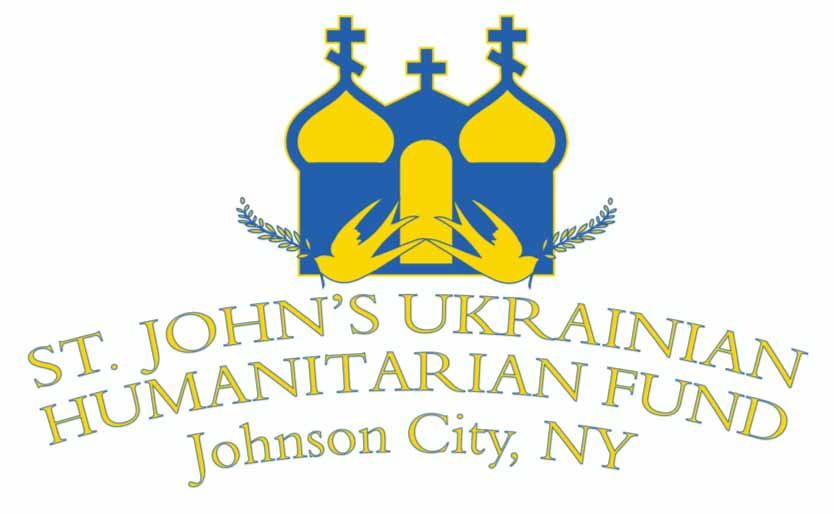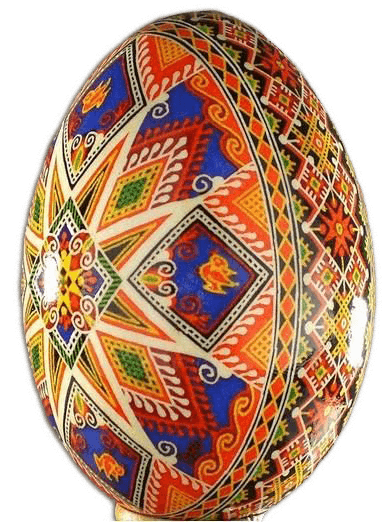Bulletin for April 13, 2025
Apr. 13 – The Entry of the Lord into Jerusalem - Вхід Господній в Єрусалим
St. Hypatius the Wonderworker, bishop of Gangra (ca. 360). Ven. Apollonius, ascetic of the Thebaid (395). Martyrs Abdas the Bishop and Benjamin the Deacon, of Persia (424). Ven. Hypatius the Healer of the Kyiv Caves (14th c.).
Phil. 4:4-9; Jn. 12:1-18;
Liturgy of St. John Chrysostom
Apr. 17 – Great Thursday – Великий Червер
THE MYSTICAL SUPPER. СПОМИН ТАЙНОЇ ВЕЧЕРІ. St. Joseph the Hymnographer of Sicily (883). St. George, monk, of Mt. Maleon in the Peloponnesus (9th c.). St. Joseph the Muchailing of the Kyiv Caves (14th c.).
1 Cor.11:23-32; Mt.26:1-20; Jn.13:3-17; Mt.26:21-39; Lk.22:43-45; Mt.26:40 - 27:2; Mt.26:6-16;
Liturgy of St. Basil the Great
Services & Other Events
13 April, Palm Sunday - Вербна Неділя:
- 9am – Confession / Hours
- 9:30am – Divine Liturgy - Бож. Літургія
- 6:30pm – Bridegroom Matins - Утреня
14 April, Great Monday - Великий понеділок:
- 6:30pm – Bridegroom Matins - Утреня
15 April, Great Tuesday - Великий вівторок:
- 6:30pm – Bridegroom Matins - Утреня
16 April, Great Wednesday - Велика середа:
- 6:30pm – Sacrament of the Holy Unction - Таїнство Миропомазання
17 April, Great Thursday - Великий четвер:
- 10am – Divine Liturgy - Бож. Літургія
- 6:30pm – Matins with 12 Gospel Readings - Утрення із 12 Євангельськими читаннями
18 April, Great Friday - Велика п'ятниця:
- 9:30am – Royal Hours - Царські Часи
- 6:30pm – Vespers with Shroud - Вечірня із винесенням плащаниці
19 April, Great Saturday - Велика субота:
- 9:30am – Divine Liturgy - Бож. Літургія
20 April, Pascha - Пасха:
- 7am – Midnight Nocturns - Полуношниця
- 7:30am – Procession and Matins - процесія та утрення
- 9am – Resurrectional Divine Liturgy - Пасхальна Божественна Літургія
- 10:45am – Blessing of Easter/Pascha Baskets - Посвячення Пасхальних Кошиків
Апостол і Євангеліє - Gospel and Epistle of the Day
The Lord's Entry into Jerusalem
"Rejoice greatly, O daughter of Zion; shout, O daughter of Jerusalem: behold, thy King cometh unto thee; He is just and having salvation; lowly, and riding upon an ass, and upon a colt the foal of an ass." (Zech. 9:9)
I. The Lord comes, but not as kings come
He, Who created the world by His word, Who holds the universe by His thought, Who commands the stars and the angels—He enters the city of men riding on a donkey. Not in a golden chariot, not on a horse of victory, but on the humble beast of poverty. He does not come to take the throne, but to ascend the Cross¹. He does not come to be worshiped, but to be spat upon. He comes not to reign, but to be condemned.
Jerusalem cries out: "Hosanna to the Son of David!"; but within that cry lies the hidden hatred of the same mouths that will soon shout: "Crucify Him!" The people gather not for repentance, but for the miracle of Lazarus. Olive branches are waved, cloaks are spread—but hearts are empty. All is outward glory, but within—death is already knocking².
He knows this. He goes knowingly. He does not flee. For every Gospel leads to the Cross, and every righteousness to suffering.
II. And they cry to Him: "Hosanna!"—but it is not faith
"And the multitude that had come to the feast, when they heard that Jesus was coming to Jerusalem, took branches of palm trees and went forth to meet Him, and cried: Hosanna! Blessed is He that cometh in the Name of the Lord, the King of Israel." (John 12:12–13)
Oh, that cry! But who uttered it? Those who sought the multiplication of bread. Those who saw miracles but did not behold His Face. Those who desired a king fashioned to their sin, not God fashioned to eternity. It was not the voice of faith, but the voice of passion³.
That crowd did not await the Cross; but a crown. They did not seek a Savior from sin; but a liberator from Rome. They did not love Christ; they used His power. Therefore, the same hands that waved branches will soon ask for Barabbas⁴.
In this is our warning. For we too often glorify Christ only when He does our will. When He comes with a whip, we do not recognize Him. When pain comes instead of a miracle, we say: "He is gone." But He, He goes to Jerusalem—to the city where He will be betrayed, spat upon, condemned, and slaughtered as a Lamb.
III. The donkey—the Throne of the King of Glory
Why a donkey? Why not a white horse, as befits a Conqueror? Why such profound humility?
Because the donkey is unclean by the Law. A non-Jewish animal. It carries a man, but does not understand him. And Christ chooses it to show that the Kingdom of God comes not by the law of men, but by grace. He chooses what is despised, what is nothing, that in it might be glorified the Glory of the Invisible⁵.
And it was not an ordinary donkey. For no man had ever sat upon it. Just as no one had lain in Christ's tomb before Him, so had that animal borne no other. It was the Throne of Divine Humility.
IV. And the city was moved—not to repentance, but to fear
"And when He had come into Jerusalem, all the city was moved, saying, Who is this?" (Matt. 21:10)
But hearts did not know Him. They ask: "Who is this?"; though they had already seen the resurrection of the dead, the cleansing of lepers, the casting out of demons. The world does not believe in holiness. The world seeks power. Thus it trembles, but it does not repent. It marvels, but it does not change. And so it is today.
The city that bore within it the Temple of God did not recognize the Visitor. The Church under the shadow of the Law did not recognize the Lawgiver. This is the image of the world when grace comes: the world trembles, but remains cold. And it seeks to pull Christ from the donkey and place itself upon the throne.
V. The Lord's first tears of Holy Week
"And when He drew near and saw the city, He wept over it, saying: If thou hadst known, even thou, at least in this thy day, the things which belong unto thy peace! But now they are hidden from thine eyes." (Luke 19:41–42)
He weeps. In the moment of glory. While they cry "Hosanna!", He weeps. For He knows that they will soon cry: "Crucify!" He sees hearts. He does not entrust Himself to men, for He knows what is in man⁶. He beholds Jerusalem—the city of prophets, the city of the Church, the city of promise—and weeps, for it does not recognize its Visitation.
These are tears of love, not weakness. Tears of omniscience, not emotion. The tears of One who loves, but is rejected. Christ's tears are not like ours; they are part of His dispensation of salvation. They are the seal of God's sorrow—that He gives man freedom, and man chooses death.
VI. The King of Glory passes through our Jerusalem
We too have our Jerusalem. Within it is the Temple of the body. Within it, the altar of the heart. But do we recognize Him when He comes meekly, not with thunder but with silence? Do we also cry "Hosanna!" when all goes well, only to shut the door when He asks of us the Cross?
He enters every Jerusalem. Mine and yours. But He comes on a donkey, not in strength. He comes in the voice of conscience, in the tear of repentance, in the cry of a child, in the wound of another. He does not come as thunder, but as a whisper. But he who has a heart will recognize Him.
VII. Beyond the Palm—there is the Cross
This is not the end. This is the beginning. Palm Sunday is not the crown, but the prologue. He goes to Bethany, thence to the Mystical Supper, thence to Gethsemane, and from there to Golgotha.
The Entry into Jerusalem is the declaration of war against hell. By this entry, He accepts the Cross. He accepts to be rejected, to be betrayed, to be slaughtered. And yet, He enters—He does not hesitate, He does not waver. For He came not to be glorified, but to be given. Not to take the kingdom of this world, but to conquer it through sacrifice.
FOOTNOTES:
The Cross as throne – According to the Holy Fathers, the Cross of Christ is not humiliation but a royal throne (St. John Chrysostom). The Entry into Jerusalem is a liturgical entry into the Holy of Holies—Golgotha.
Outward religion – St. Theophan writes that faith without repentance and inner union with God becomes an empty ritual.
Faith of passion – If faith is founded on emotion or the expectation of miracles, it easily turns into blasphemy when it does not receive what it wants (St. Gregory Palamas).
Barabbas – A symbol of the man of the world: violent, but "useful." People choose Barabbas because he suits their spirit better.
Liturgical symbolism of the donkey – The donkey symbolizes the Gentiles, whom Christ will receive into the New Israel.
The Lord does not trust men – John 2:24–25: "But Jesus did not entrust Himself to them, for He knew all men."
by Priest Aleksandar Radunovic
Вербна неділя. Вхід Господній у Єрусалим
Вхід Господній у Єрусалим завершує піст святої Чотиридесятниці й, одночасно, розпочинає суворий піст Страсного тижня. Вхід Господній у Єрусалим називають Пальмовою, а в Україні (де не ростуть пальми) Вербною неділею, бо цього дня Ісус Христос урочисто в'їхав до святого міста і люди вітали Його стелячи на землю власний одяг та пальмові гілки. В сучасному світі аналогом такого вшанування є простелений червоний килим яким зустрічають високоповажних гостей. Подія Урочистого Входу Господнього у Єрусалим описана усіма чотирьма Євангелістами: Мф. 21:1-17, Мк. 11:1-11, Лк. 19:29-48, and Ін. 12:12-19.
Майже 80 років з того часу, як римляни, скинувши єврейського царя, окупували Ізраїль, полонений народ мріяв про повстання. Останні великі заворушення сталися після смерті Ірода Великого (4 рік до Р.Х.). Повстання почалося в столиці Галілеї Сепфорісі, що в кількох милях від Назарету, де провів своє дитинство Спаситель. Жорстоко придушуючи заколот, римська армія повністю зруйнувала Сепфоріс і Еммаус і, покінчивши з бунтівними містами, вирушила до Єрусалиму. Приборкавши місто, завойовники розіп'яли 2000 євреїв, підозрюваних в участі у повстанні. З того часу місцеві римські правителі завжди були напоготові жорстоко покарати будь-яке прагнення до волі.
Пилат, як правитель регіону, що крім Юдеї включав Самарію та Ідумею, підкорявся виробленій практиці керівників римських провінцій особисто бути присутнім на великих релігійних заходах. Саме тому, взявши відбірних воїнів, він вирушив із прибережної Кесарії до задушливої, переповненої паломниками провінційної столиці релігійного життя юдеїв – Єрусалиму.
Протиставлення царств
Пилат також служив "сину божому". Імператор Август, що правив з 31 року до Р.Х. по 14 рік після Р.Х., вважався сином Аполлона та смертної жінки Атії. Посвячення йому посилалися, як "сину божому", "господу" і навіть "спасителю". За легендою, після смерті він зійшов на небо й зайняв місце серед богів. Наступник Августа – Тиберій, що був імператором за часів земного життя й служіння Спасителя – також носив божественні титули. Лише пізніше, у другій половині першого століття, імператори почали вимагати не лише іменувати себе богами, але й здійснювати богослужіння на свою честь…
Юдеї сподівалися, що Христос буде великим воїном – визволить Ізраїль від ненависної окупаційної влади та підкорить йому інші народи. Саме тому юрба вимагала смерті Ісуса лише через кілька днів. Населення втратило віру в те, що Христос може і хоче виконати їх волю. Більше того, дії Спасителя загрожували зробити їх життя не кращим, а ще гіршим. Єврейські релігійні лідери, що ніколи не згоджувалися один з одним із жодного питання, цього разу виявили вражаючу однодумність. Прикута до Христа увага, помножена на народні очікування, привертала увагу римської влади та могла викликати каральні санкції проти всього народу…
Уявіть себе на вузьких вулицях прадавнього Єрусалиму тої самої Вербної неділі. Перед вами дві процесії. Одна має силу і владу від кесаря, друга, на чолі з Сином Божим, несе мир і любов. Запитайте себе: "До якої з цих двох процесій приєднався би я?" Це питання важливе тим, що подібний вибір людина робить кожного дня. Ми робимо або "як усі", намагаючись вписатися в структуру сьогодення, або "як це заповідав Господь". Дві процесії. Два богослов'я. Два вибори. Обрати відданість Богові, або князю світу цього. Цей вибір тягне за собою випробування і відповідальність…
St. John's Ukrainian Humanitarian Fund

Today, on this Kvitna/Verbna Nedilya (Blooming/Willow Sunday, i.e. Palm Sunday) we greet and tap our friends and family with our blessed pussy willow branches and wish them all strength, happiness and health with the traditional Ukrainian saying:
Не я б'ю — верба б'є, За тиждень — Великдень,
Будь дужий, як вода, А багатий, як земля!
I do not tap – it is the willow that taps, Easter comes in one week.
Be strong as the water, and rich as the earth!
In spirit, we also extend our greeting to the people in Ukraine, as they continue to fight courageously to preserve their God given freedoms, national sovereignty, and democracy. On February 21, we marked the third anniversary of Putin's unprovoked genocidal war against Ukraine with an Inter-Faith service at the Broome County Court House. We prayed for the deceased and suffering; and we thanked God for sustaining the brave people of Ukraine as they have withstood three years of relentless attacks, hundreds of thousands of deaths and injuries (including thousands of children killed, injured and abducted) and wanton destruction in every region of the country. Now, as this barbaric war enters its fourth year, Ukraine is sadly confronted with unprecedented challenges and uncertainties raised by the leaders of our government, who publicly berated the President of Ukraine and now pressure him to cease fighting, sign over Ukraine's rare earth minerals, give up the nuclear power plant in Zaporizhzhya, and surrender 20 percent of illegally occupied territory and the people that live there, without any such demands of Putin and his Russian terrorist state.
This unfortunate un-American situation has not, and will not, dissuade our St. John's Ukrainian Refugee and Humanitarian Assistance Committee and our church from doing what is right by standing with Ukraine. We are proud to report that during the first quarter of 2025, we continued to work with our members and partners on numerous outreach activities in our community to highlight Ukraine's battle for freedom and justice in the world. Thanks to our fund raising efforts and compassionate donors we were able to raise and contribute ten thousand dollars to support the humanitarian work being carried out by the Ukrainian Orthodox Church of the USA, Revived Soldiers Ukraine, Ukrainian American Veterans, and BlueCheck Ukraine. We are sincerely grateful to all of our donors, past, present and future who make this possible.
So, as we remember the passions of Christ during this Holy Week, along with our departed loved ones and those honored here, let us keep the suffering people of Ukraine in our prayers so they too may celebrate His Resurrection in peace, harmony and joy someday soon as we hope to do in one week's time.
Vichnaya Pamyat – Memory Eternal: The Innocent Children of Ukraine, Lydia Klecor, Marlyn Klish (4x), Heroes of Ukraine, John Kasprowitz (2x), Anastasia Kasprowitz, Marianne (Sunny) Lawryk, Dmytro Wasylko, Peter M. Dobransky, Ralph Winters, and Sofie Casper
In Honor of: Birth of Margo Stefka Merkel-Muraskin and Birthday of Jessica Corbin.
Pysanky 2025

The varnished Pysanky eggs are on the kitchen counter. Thank you to Dr. Mark Hatala for making them shine.
Roast Pork Dinner

Let's Help Ukraine!
St. John's Ukrainian Humanitarian Fund is accepting donations to help Ukrainians during war. Donations will go to provide food and other humanitarian needs.
To make donation online click here
We accept checks as well.
Please make the checks to St. John Ukrainian Humanitarian Fund
Mailing address:
1 Saint John's Parkway
Johnson City NY 13790
Cash is accepted in church
Pray for Ukraine!
Prayers for Ukraine are done during each service. To see the schedule click here.
Молитви за Україну проводяться під час кожної служби. За розкладом дивіться тут.
May God bless and protect Ukraine!
Please Note!
- Only Orthodox Christians may receive Holy Communion or other Sacraments.
- If you have not been to confession in over a month, please go to confession before receiving the Holy Gifts.
- We fast from all food and drink (including water) from bedtime (the previous night) until we receive the Holy Gifts during morning Divine Liturgy. That also means no coffee, no cigarettes, no gum, candies in the morning and during Divine Liturgy.
Happy Birthday
- April 16: Hania Lewkowicz
- April 17: Mary Ann Eagan
- April 17: Hayden Dickstein
- April 17: Tamara Chebiniak
- April 17: Jean Sankowski
- April 18: Kennedy Schumacher
- April 18: Nadya Wasylko
- April 19: Benjamin Holicky
* If your or someone else's birthday is missing or incorrect please let Fr. Ivan know right away.
Please Pray for the Servants of God
John, Rose, Bob, Nadine, Dannette,
John, Jane, Mary, Zenna, Douglas,
Melanie, William, Marion, Helen,
Mariann, Robert, Jean, Ronald, Brian,
Fr. James, Scott, Andriy, James, William,
Pipinos, Fr. Gabriel and PM Susan
Upcoming Readings
| Mon. Apr. 14 – | Mt. 21:18-43; | Mt. 24:3-35; |
| Tue. Apr. 15 – | Mt. 22:15 - 23:39; | Mt. 24:36 - 26:2; |
| Wed. Apr. 16 – | Jn. 12:17-50; | Mt. 26:6-16; |
| Thu. Apr. 17 – | 1 Cor.11:23-32; | Mt.26:1-20; Jn.13:3-17; Mt.26:21-39; Lk.22:43-45; Mt.26:40 - 27:2; Mt.26:6-16; |
| Fri. Apr. 18 – | 1 Cor. 1:18 - 2:2 | Mt. 27:1-38; Lk. 23:39-43; Mt. 27:39-54; Jn. 19:31-37; Mt. 27:55-61; |
| Sat. Apr. 19 – | Rom. 6:3-11; | Mt. 28:1-20; |


